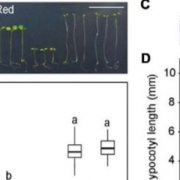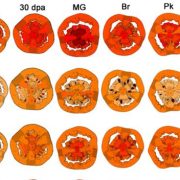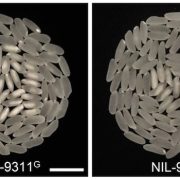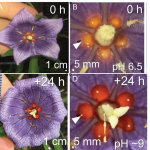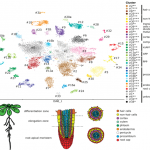Ethylene augments root hypoxia tolerance through amelioration of reactive oxygen species and growth cessation (bioRxiv)
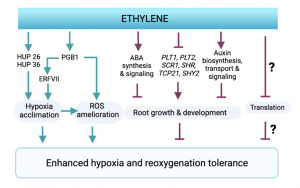 Flooding presents a dual threat to plants; not only is mitochondrial respiration supressed during the resulting hypoxic conditions, but once the floodwaters recede, the return to ambient oxygen levels triggers a cascade of harmful reaction oxygen species (ROS). One of the most well-studied responses to flooding stress is the accumulation of the gaseous hormone ethylene. While the core transcriptional machinery responsible for this response has been identified in Arabidopsis, the downstream pathways involved in hypoxia acclimation remain unclear. In this study, the authors show that pre-treating Arabidopsis plants with ethylene before exposing them to hypoxic and then re-oxygenated conditions reduces cell death in root tip cells. To reveal the mechanisms behind this, they conducted transcriptomic and proteomic analysis, showing that ethylene modulates mitochondrial metabolism, protein turnover, and ROS homeostasis during hypoxic conditions. This ethylene-induced ROS tolerance appears to be at least partially mediated by the proteins PGB1 and PRT6, which have previously been linked to flooding and general abiotic stress tolerance across multiple species. Ethylene also limits root growth, via its effect on auxin synthesis, and the authors show that this growth repression has a direct effect on hypoxia tolerance. (Summary by Rory Burke @rorby95) bioRxiv 10.1101/2022.01.21.477196
Flooding presents a dual threat to plants; not only is mitochondrial respiration supressed during the resulting hypoxic conditions, but once the floodwaters recede, the return to ambient oxygen levels triggers a cascade of harmful reaction oxygen species (ROS). One of the most well-studied responses to flooding stress is the accumulation of the gaseous hormone ethylene. While the core transcriptional machinery responsible for this response has been identified in Arabidopsis, the downstream pathways involved in hypoxia acclimation remain unclear. In this study, the authors show that pre-treating Arabidopsis plants with ethylene before exposing them to hypoxic and then re-oxygenated conditions reduces cell death in root tip cells. To reveal the mechanisms behind this, they conducted transcriptomic and proteomic analysis, showing that ethylene modulates mitochondrial metabolism, protein turnover, and ROS homeostasis during hypoxic conditions. This ethylene-induced ROS tolerance appears to be at least partially mediated by the proteins PGB1 and PRT6, which have previously been linked to flooding and general abiotic stress tolerance across multiple species. Ethylene also limits root growth, via its effect on auxin synthesis, and the authors show that this growth repression has a direct effect on hypoxia tolerance. (Summary by Rory Burke @rorby95) bioRxiv 10.1101/2022.01.21.477196


